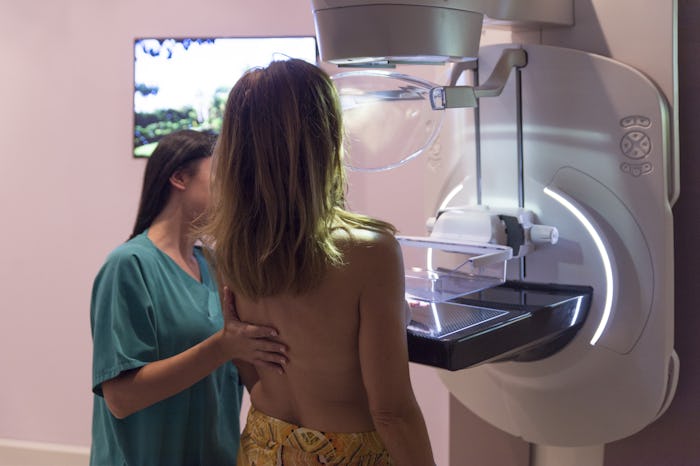Life

Do I Have The BRCA Gene? How To Know & Understand Your Breast Cancer Risk
Being proactive about reducing your cancer risk is always a good idea, but there's so, so much info to process. You might wonder to yourself, so do I have the BRCA gene? Learning more about how your genetics can affect breast cancer risk will bring a lot of light to this difficult subject.
First, it's helpful to understand a little more about BRCA genes and what they do in the body. "Two of the most well-known genes that can mutate and raise the risk of breast and/or ovarian cancer are BRCA1 and BRCA2. In fact, BRCA is an abbreviation for "BReast CAncer gene,'" Marisa Weiss, M.D., founder and chief medical officer of Breastcancer.org, tells Romper via email. However, the genes themselves are harmless and present in all humans. "All people have BRCA genes in every cell of the body, and their function is to keep breast cells growing normally and prevent cancer cell growth," explains Dr. Weiss. When they're functioning regularly, the BRCA genes are a helpful part of the body.
However, when mutations enter the equation, that's when BRCA genes can present a cancer risk. And what is a mutation, exactly? "We have two copies of each gene and when one of those copies has a 'misspelling' or 'mutation' in the genetic code of that gene, then that individual is at higher risk of getting certain types of cancer," Rebecca Kaltman, M.D., director of the Ruth Paul Cancer Genetics and Prevention Service at the GW Cancer Center, tells Romper in an email. To make matters worse, these mutated genes can also be inherited from your parents. "But when these genes contain mutations that are passed on from generation to generation, they do not function normally and the risk of breast, ovarian, and certain other cancers increases," says Dr. Weiss. "It’s estimated that up to 10 percent of breast cancers are linked to an inherited genetic mutation in BRCA1, BRCA2, or the lesser known PALB2 gene." Although the genes themselves are an ordinary part of the body, they can increase the risk of breast cancer if these mutations occur.
So how can you know for sure whether you have the type of genetic mutation in BRCA1 or BRCA2 that's associated with breast cancer? There are some potential signs. "Those at risk for carrying a mutated BRCA gene often have family histories of early onset breast cancer (before age 50), ovarian cancer, prostate cancer, pancreatic cancer, and/or melanoma," says Dr. Kaltman. "They might also have personal histories of cancer that are suggestive of a genetic cancer syndrome, like triple negative breast cancer." However, there's one way to know for certain whether you have this genetic mutation. "Genetic testing could identify individuals who might have a mutation," Dr. Banu Arun, professor of Breast Medical Oncology and co-medical of one of the largest Clinical Cancer Genetics Programs in the nation (the Clinical Cancer Genetic Program at The University of Texas MD Anderson Cancer Center) tells Romper. Other experts support this idea as well. "Everyone has BRCA1 and BRCA2 genes, but medical grade genetic testing obtained through a licensed certified genetic counselor or a comparably qualified healthcare provider is the only way to confirm if you have a mutation in either of these genes," says Dr. Weiss. Lastly, this kind of genetic testing can be an important way to protect your health for the future. "We strongly recommend that if you are concerned that you might be at higher risk of developing cancer, due to a family or personal history of cancer, that you be seen by a genetic counselor to consider further testing," says Dr. Kaltman. For the most part, genetic testing is the clearest way to tell whether you have a BRCA gene mutation associated with breast cancer.
So what happens if the test comes back positive? You don't have to panic. Even if you do test positive for the BRCA gene mutation, there are still plenty of ways you and your medical team can work together to protect your health. "We know that interventions such as increasing doctor's examinations and imaging can help with early detection of cancers, particularly in those at higher risk from cancer," says Dr. Kaltman. "In addition, sometimes medication and preventative surgery is indicated to lower cancer risk, but this is a very individualized decision." Although facing your potential breast cancer risk is a scary prospect, your medical team has plenty of strategies to help guard your health. Even for people who have the BCRA gene mutation linked to breast cancer, there's still plenty you can do to reduce that cancer risk, so reach out to your healthcare provider for advice.